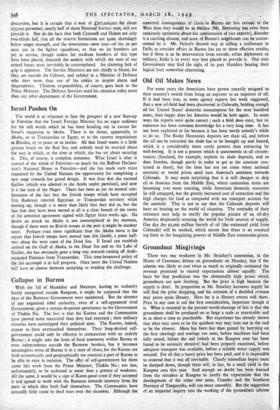Old Oil Makes News
For some years the Americans have grown uneasily resigned to their country's switch from being an exporter to an importer of oil. If it had been true, as some agency reports last week suggested, that a new oil-field had been discovered in Colorado,' holding enough oil for United States' domestic consumption for the next hundred years, then happy days for America would be here again. In some ways the reports were quite correct ; such a field does exist, but its existence has been common knowledge for a very long time. It has not been exploited so far because it has been worth nobody's while to do so. The Rocky Mountains deposits are shale oil, and before the oil can be extracted the shale has to be brought up and heated, which is a considerably more costly process than extracting by well-boring. It is not a process which is uneconomic in all circum- stances (Scotland, for example, exploits its shale deposits, and so does Sweden, though partly in order to get at the uranium con- tained in them), but the time has not yet come when national necessity or world prices need turn America's attention towards Colorado. It may seem surprising that it is still cheaper to ship oil to America from the Middle East, where concession terms are becoming ever more exacting, while American domestic resources lie still untapped, but the greatly increased cost of extraction and the high charges for land as compared with sea transport account for the anomaly. This is not to say that the Colorado deposits will have no bearing on the world oil situation. The reminder of their existence may help to rectify the popular picture of an oil-dry America desperately scouring the world for fresh sources of supply. One day the 92,000 million barrels of oil (the estimated yield from Colorado) will be worked, which means that there is an eventual top limit to the bargaining powers of Middle East concession-givers.






































 Previous page
Previous page